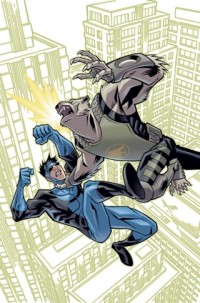 Home > CR Reviews
Home > CR Reviews The Astounding Wolfman #11
posted February 1, 2009
The Astounding Wolfman #11
posted February 1, 2009

 Creators:
Creators: Robert Kirkman, Jason Howard, Cliff Rathburn
Publishing Information: Image, comic book, 32 pages, January 2009, $2.99
Ordering Numbers:
For those of you not up on his career, the writer Robert Kirkman has two popular long-running serials at the company that this last year took him on as a full partner:
Walking Dead and
Invincible.
Walking Dead is a zombie movie on paper that doesn't have to rush to resolution or the cheat of greater understanding; I think it's the more broadly admired of the two series.
Invincible is stranger because on the surface it's another step-back, self-contained superhero story with retro overtones of the kind that maybe a dozen similar writers have attempted and with which few have succeeded. It's always baffled me a bit. While it's not the kind of series I'd regularly follow I tend to pay more attention to it than I might some others, trying to figure out a clue. Of all the series at least a little bit like it, why does this one work?
A recent story featuring a crossover into a third, less-successful Kirkmen-written series suggested something to me about
Invincible I think may hint at the core of its success. The superhero Invincible explains to the werewolf guy that the government agents plaguing them both cut him some slack because they know he's the best chance to save the planet if something dire (and science-fictiony) heads its way. This made me realize that
Invincible definitely offers the
other half of the original
Spider-Man set-up: nearly all of the adults are jerks with agendas that make them poor role-models to the title character. This includes the character's father, at least in a thematic sense. In
Spider-Man the lack of anything to latch onto meant Peter Parker had to work that much harder to grow as a moral being, drawing on better role-models (the memory of Uncle Ben) and his own experience to fashion a serviceable way of looking at the world. In
Invincible, it means the lead character uses the growing competence his basic values bolster to distance himself from the collective jerky influence of the adult world and carve a space for himself. In short, Lee and Ditko gave us, "With great power comes great responsibility." Kirkman and his creative partners seem to be saying, "With great power comes less bullshit." Who doesn't find
that appealing?


